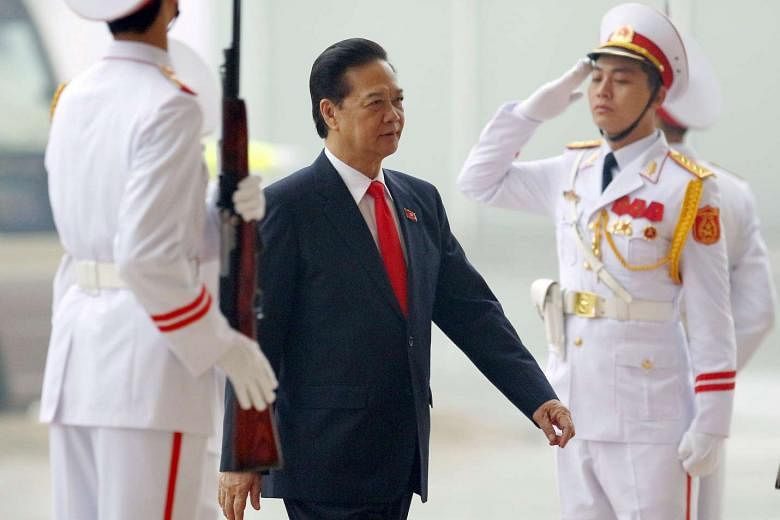HANOI (AFP) - Vietnam began a crucial political transition on Thursday (Jan 21) as the five-yearly Communist Party congress convened to pick new leaders, who will face challenges ranging from a maritime standoff with China to much needed economic reform.
In front of more than 1,500 party delegates, amid great pomp and ceremony, Vietnam's President Truong Tan Sang opened the meeting in Hanoi, which will last a week and take place largely behind closed doors.
The secretive party, which has ruled since the 1975 end of war, will reshuffle its top brass, with 10 out of 16 politburo members - including the party general secretary, president and prime minister - technically due to retire.
The run-up to the congress has been marked by a very public factional struggle between the party's traditional wing, who are seen as being closer to Beijing, and more modern reformers like Prime Minister Nguyen Tan Dung.
Dung, who presided over Vietnam joining the World Trade Organisation and the US-led Trans Pacific Partnership (TPP) trade deal, had been tipped by analysts to move up to the powerful general secretary position, becoming party leader.
But incumbent Mr Nguyen Phu Trong, seen as more a conservative apparatchik, has been manoeuvering to extend his term in office - and appears to have triumphed.
"The path of socialism is still suitable to the reality in Vietnam," Mr Trong said as he opened the meeting Thursday (Jan 21).
One senior communist party official, speaking on condition of anonymity, said while nothing was certain, the prime minister appeared to be on his way out.
"Nguyen Tan Dung's political career can be declared 'clinically dead,'" he told AFP.
That would be bad news for modernisers, say analysts, who point out that while neither side would dramatically change course on any issue, Mr Dung's faction is broadly the more competent, pro-market option.
"With Dung, the country will move much further and much more quickly," on issues like market reforms, free trade deals, and security ties with the US, Vietnam expert Carl Thayer told AFP.
Dung is also seen as more outspoken on a maritime dispute with China, which this week moved an oil rig into waters claimed by Hanoi.
"China always keeps up the pressure on the Vietnamese leadership, especially before and during the party congress," said Mr Duong Danh Dy, a retired Vietnamese diplomat who spent 14 years at the embassy in Beijing.
China last moved the rig into contested waters in 2014, triggering protests and riots in Vietnam that left at least three people dead, and prompting Hanoi to move closer to its former wartime foe the United States.
The party congress will also approve a five-year economic blueprint, which will seek to build on recent impressive economic growth of nearly seven percent annually, a rate that is one of Asia's strongest.
With a slew of foreign trade agreements including the US-led TPP pact ahead, experts and foreign investors are urging Vietnam's leadership to pursue long-stalled domestic reforms, including overhauling the banking sector and moving more aggressively on privatising state owned companies.

